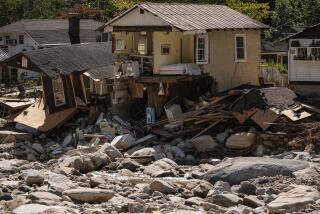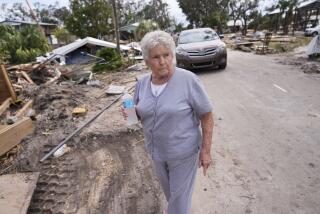Virus-weary Texas hit by Category 1 Hurricane Hanna
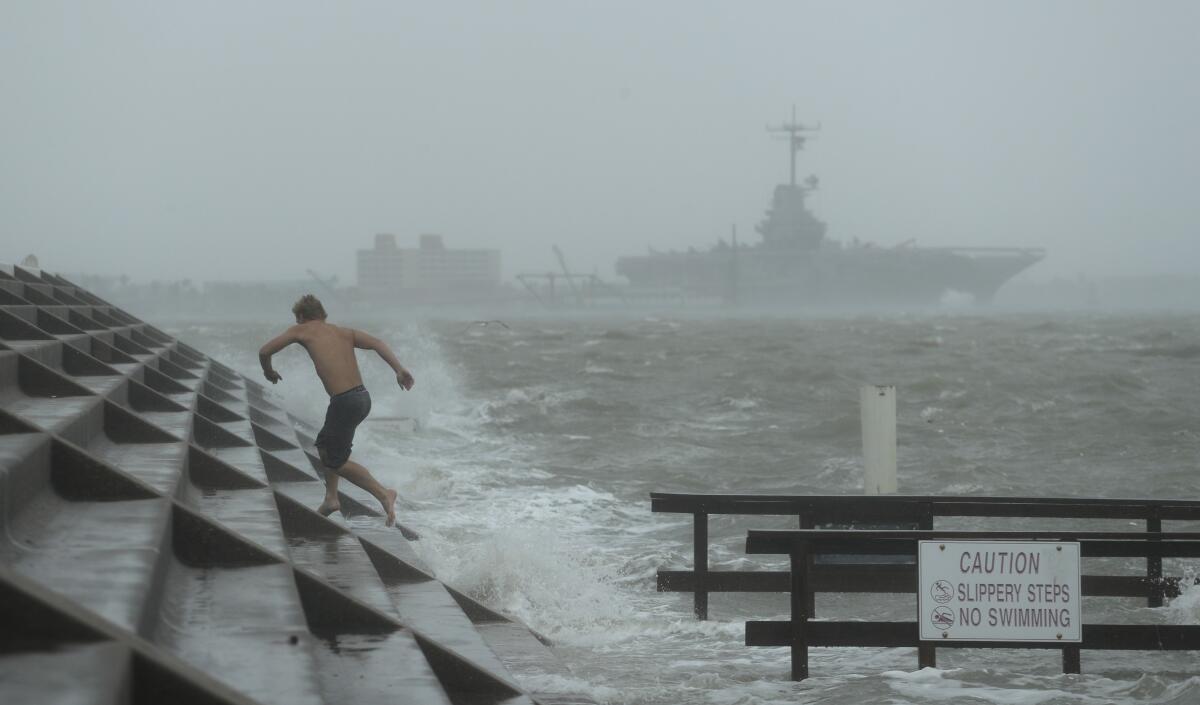
- Share via
CORPUS CHRISTI, Texas — Hurricane Hanna roared ashore onto the Texas Gulf Coast on Saturday, bringing winds that lashed the shoreline with rain and storm surge, and even threatening to bring tornadoes to a part of the country trying to cope with a spike in coronavirus cases.
The first hurricane of the 2020 Atlantic hurricane season made landfall twice as a Category 1 storm on Saturday afternoon within the span of little over an hour. The first landfall happened at around 5 p.m. about 15 miles north of Port Mansfield, which is about 130 miles south of Corpus Christi. The second landfall took place nearby in eastern Kenedy County. Hanna had come ashore with maximum sustained winds of 90 mph. As of Saturday evening, those winds had slightly weakened to 85 mph.
Many parts of Texas, including areas near where Hanna came ashore, have been dealing with a surge in coronavirus cases in recent weeks, but local officials said they were prepared for whatever the storm might bring.
Chris Birchfield, a meteorologist with the National Weather Service in Brownsville, said residents needed to remain alert. While Hanna’s winds were expected to weaken Saturday night, the storm’s real threat remained heavy rainfall, he said.
“We’re not even close to over at this point. We’re still expecting catastrophic flooding,” Birchfield said.
Forecasters said Hanna could bring 6 to 12 inches of rain through Sunday night — with isolated totals of 18 inches — in addition to coastal swells that could cause life-threatening surf and rip current conditions.
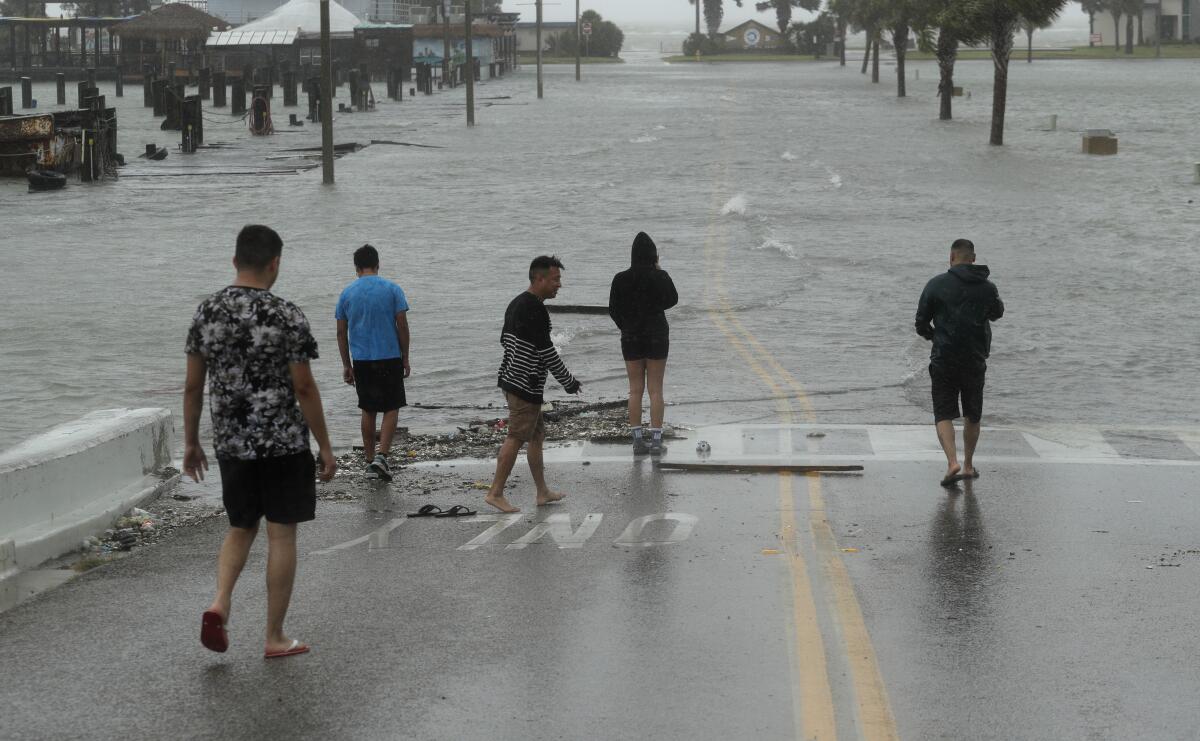
Some areas in south Texas had reported receiving up to 9 inches of rain, including Cameron County, where Brownsville is located, bordering Mexico. Rainfall totals were expected to rise throughout the evening and into Sunday.
“It’s been all day,” Melissa Elizardi, a spokeswoman for Cameron County Judge Eddie Treviño, said of the rainfall.
In a tweet, President Trump said his administration was monitoring Hanna, along with Hurricane Douglas, which was heading toward Hawaii in the Pacific Ocean.
Sherry Boehme, who lives in a condo along the beach in Corpus Christi , said the storm’s approach had increased the anxiety she has felt during the pandemic. The 67-year-old has mostly stayed at home because of health issues.
“It’s almost like a double whammy to us,” Boehme said Saturday by phone. “I think it’s made a lot of people nervous.... We’ll get through it. Everybody is good and strong and sticks together.”
Boehme said she’s already felt 60 mph wind gusts at her condo and has seen a surge of water coming from Corpus Christi Bay. Most people seemed to be staying home, as traffic was light, she said.
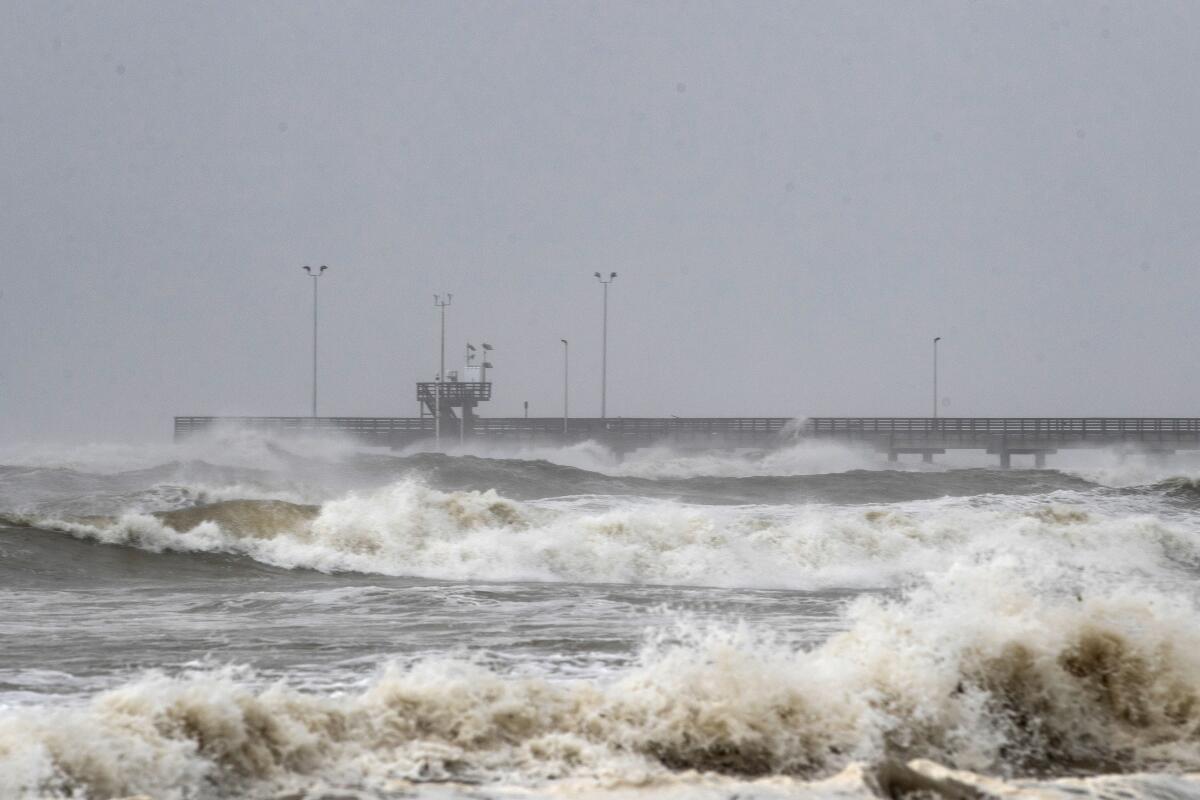
Judge Barbara Canales, the top elected official in Nueces County, where Corpus Christi is located, said officials were highly concerned about the storm surge that was already moving inland. Live webcam footage showed waves sweeping over popular Whitecap Beach near Corpus Christi hours before the hurricane was expected to make landfall.
First responders in Corpus Christi placed barricades near intersections to have them ready to go if streets begin to flood, McComb said. More than 43,700 people throughout south Texas, including Corpus Christi, Harlingen and Brownsville, were without power Saturday evening, according to electric utility AEP Texas.
Just days ago, officials revealed that 60 infants in Nueces County tested positive for COVID-19 from July 1 to July 16.
Farther south in Cameron County, which borders Mexico, more than 300 confirmed new cases have been reported almost daily for the past two weeks, according to state health figures. The past week has also been the county’s deadliest of the pandemic.
Coastal states scrambled this spring to adjust emergency hurricane plans to account for the virus, and Hanna loomed as the first big test.
South Texas officials’ plans for any possible rescues, shelters and monitoring of the storm will have the pandemic in mind and incorporate social distancing guidelines and mask wearing. Gov. Greg Abbott said various resources to respond to the storm were on standby across the state, including search-and-rescue teams and aircraft.
Tornadoes were also possible in the area Saturday, forecasters said Friday. A hurricane warning remained in effect for Port Mansfield to Mesquite Bay, which is north of Corpus Christi, and a tropical storm warning was in effect from Port Mansfield south to Barra el Mezquital, Mexico, and from Mesquite Bay north to High Island, Texas, near Houston.
Mexico’s northeasternmost states, coastal Tamaulipas and Nuevo Leon just to its west, also took precautions ahead of the storm’s arrival. Tamaulipas was preparing shelters and disinfecting them to try to avoid spreading COVID-19, the state’s governor, Francisco Cabeza de Vaca, tweeted. Meanwhile, the civil protection department was sending rescue boats and other equipment to northern Nuevo Leon because heavy rains were expected.
David León, the national director of the civil protection department, told Milenio TV that as many as 800 shelters were available in the parts of Mexico that could be affected by Hanna.
In the city of Matamoros, across the border from Brownsville, Texas, volunteers were keeping a close eye on Hanna, worried that the storm could affect a makeshift camp near the Rio Grande where about 1,300 asylum seekers, including newborn babies and elderly residents, have been waiting under the U.S. immigration policy informally known as Remain in Mexico.
Meanwhile, a Pacific Ocean hurricane, Douglas, was heading toward Hawaii on Saturday. The National Hurricane Center said Douglas had maximum sustained winds of 100 mph as of Saturday morning and was expected to weaken but could pass “dangerously close to, or over” the main islands late Saturday through Sunday night. Hurricane warnings were in effect for Oahu and Hawaii and Maui counties.
More to Read
Sign up for Essential California
The most important California stories and recommendations in your inbox every morning.
You may occasionally receive promotional content from the Los Angeles Times.
